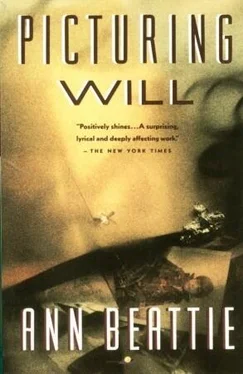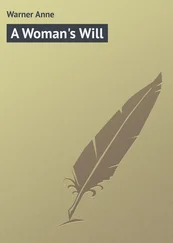As she came to the end of the row of brownstones, she saw the man who lived in the garden apartment sitting on the front steps, watching his dog play with a bone on the little patch of cement inside the front gate. Daryl was a good-looking man in his late fifties who had retired from NBC, where he had worked as a cameraman, to devote his time to his great love: the acquisition and repair of jukeboxes. The garden behind the brownstone prospered because it was cared for by his sister, who came from her apartment in Hoboken two or three times a week to plant and prune. His sister was responsible for ending — or almost ending — the springtime ant problem in Mel’s apartment. The ants had climbed the twisting wisteria boughs and come through the screens until Estelle ingeniously designed an upside-down funnel that fit around the base of the vine and sprayed it with chemicals to repel ants. “All he has to do is remember to douse it every couple of days, but I know he slips up,” Estelle had said to Jody when she last visited. “All his life he’s put his cereal bowl in the sink ‘to soak,’ which means that he was too lazy to wash it. All men are the same about their cereal bowls — as if they’d be washing a part of themselves down the drain if they cleaned them. Cereal bowls are sitting in sinks all over America, filled to the brim with water.” Naturally, Jody was crazy about Estelle. She loved to be invited to walk in the garden behind the apartment to see the little plants and flowers. From the fourth floor, most of the flowers were only a pastel haze.
“She’s not here today,” Daryl said. “I thought I’d take the opportunity to sit out front. She gets insulted if I want to see some city life instead of flowers.” He picked up the blue leash the dog trailed behind it. She smiled down at the little dog, whining happily to see her at the front gate. Will had been asking for a dog. She suspected that Will and Mel were in collusion.
“The tulips are up,” Daryl said. “The ones with the green centers.”
“Parrot tulips,” she said.
Daryl gave her the look a parent gives a child who has said a dirty word the parent would like to disappear from the child’s vocabulary: a glazed-over look, with the trace of a prim smile.
The dog ran up the steps behind her and stood panting at the front door. Daryl got up and brought the dog down the stairs again. She put her key in the door and pushed it open — it always stuck on the ugly carpeting — then closed it behind her. The half-table in the hallway had a vase of dried flowers on it, and the gray rug had been recently vacuumed. This was because the second-floor apartment was empty. The landlord always put out flowers and hung a painting in the stairwell when an apartment was empty. When it was filled again, the painting would disappear and the flowers would be left to crumble into confetti on the tabletop.
Climbing the stairs, Jody thought about the peculiarity of walking into someone else’s life. Now the dog downstairs knew her. Just like that, she was greeted by the small things that surrounded Mel’s life. You never merely took on another person, you drew all the things surrounding that person to you like a magnet — the postman’s nod, the gas station attendant smiling through the windshield at both of you, the waiter who asks, “How are you?” and looks to both faces, the colleague’s wife who asks you to lunch. Before you knew it, there would be a drinking glass that was your favorite; the lipstick you left behind would be put in a dish on the back of the toilet. He’d hide your toothbrush so you’d go home and have to buy another, and then there the toothbrush would be, in the holder, the next time you went back. You’d know that you were in deep when your things began to proliferate in the apartment: things he bought for you, to be yours , if you did not leave enough behind. When he stopped taking his blue shirt to the dry cleaner and started tossing it in the wash because it had become your favorite nightgown. When he bought you a plant instead of cut flowers so you would call to make sure it had been watered. When cotton pullovers became unisex and got jumbled together. When pictures of the two of you were put on the refrigerator. When other women called and he didn’t close the door or lower his voice and, when he hung up, acted as if your conversation hadn’t been interrupted.
That was the thing about taking photographs. About taking wedding photographs, at least: that the people you were seeing wanted so sincerely to belong. It was desperation rather than vanity that made them look soulfully into the camera, because the camera had the power to stop time and to verify that they were part of a tradition. That was why brides wore their grandmothers’ wedding dress (a little too tight in the waist, and the shoes were always too small; few brides could walk down the aisle in their grandmother’s size-five shoes). It was a celebration that all generations were invited to witness, and sometimes the dog as well. The bride was always asking an implicit question: Don’t you remember this? Even if you don’t understand my life now or know me very well, doesn’t this ceremony constitute a link between us? Isn’t this your engagement ring I’m wearing? Haven’t I styled my hair with the waves that swept my mother’s cheeks at her wedding? Isn’t this the wedding cake we’ve always eaten, even though we’ve never had dessert together? The figurines at the top are generic. The bubbles in expensive champagne don’t vary in size. I’m in love. Don’t you remember being in love?
At a wedding she photographed recently, some relative of the groom had said to her, “Love is like a feather in the breeze.” People often said startling things at weddings, so perhaps it was just the dreamy — no, deranged — look on the woman’s face that had made Jody force a smile. As the old lady walked away from her, Jody had thought several things in quick succession: Love, that exhilarating and exhausting state, is whatever anybody says it is, so stop the poetry and end the song; love is, indeed, like a feather; love is nothing like a feather; the word “breeze” might have been indicative of the lady’s attitude, because a feather in the wind would be another matter entirely.
Jody put her key into the lock and opened the door. A flight of steep black-painted steps rose into Mel’s apartment. Except for two rooms in the front, under the steep pitch of the roof, the area was open space, with an off-center stairwell surrounded by a high railing. It was like being in a treehouse; tall windows at the back overlooked the tops of ailanthus trees growing below. In the kitchen there was a skylight through which wisteria had pushed its way. When it rained, the top of the stove would be moist, and occasionally tiny flowers would be scattered over the stovetop. When Mel turned on the stove he ignored them, but she always brushed them away, as if they were alive. She sat for a minute, a little out of breath, on the sofa that curved around the room. No sofa in New York rose higher than midback.
Mel had left a note for her on one of the sofa cushions. Apparently Duncan had called to say that his former roommate, who lived on Christopher Street, had just gotten very bad news from a blood test. What was she supposed to do? Call some man she’d never met? She pushed the note aside and wandered away. Tucked in the bathroom mirror was a picture of Will, straddling Mel’s neck, proud of his new red sneakers and looking as secure, perched there, as the driver of an armored car. Recently, Mel had instigated the silliness of nicknames. Some days Will wanted to be Ace, some Butch. She thought that on the day the picture had been taken he was Ace. Ace in need of a haircut. Ace, who swung as hard as he could and still didn’t raise a bruise on Mel’s bicep. (“Of course you can’t hit me in the stomach,” Mel had said to him. “You’d hurt me.”) She looked at the lipstick on the saucer on top of the toilet tank. Mel would like it — he liked any profession of affection, however corny — if she scrawled I LOVE YOU on the bathroom mirror. The lipstick had cost ten dollars. Ten dollars for lipstick! She took off the cap and put lipstick on her lips but didn’t write on the mirror. She filled a glass with water and rose on tiptoes to water the spider plant. Putting the glass back in the holder, she remembered one of Mel’s peculiarities: wiping the glass, after use, with his bath towel. How could men be so neat about some things and so haphazard about others?
Читать дальше












